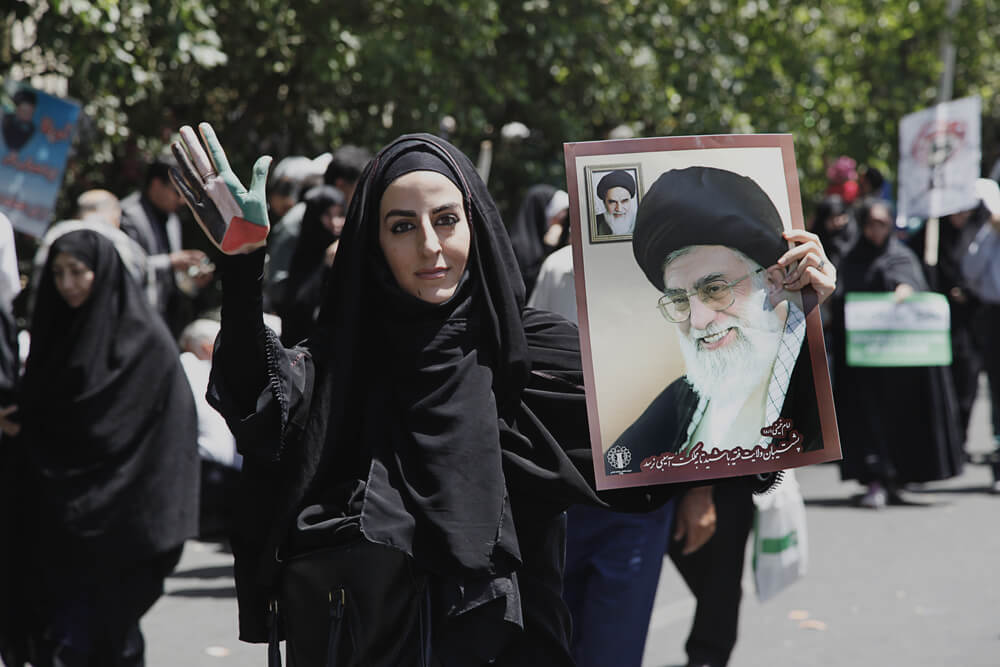When a madman throws a stone down a well, according to an ancient Iranian aphorism, ten wise men and women are needed to remove it.
Ayatollah Ali Khamenei, Iran’s currently secluded supreme leader, was that madman, and now many people in Iran and around the world are trying to salvage the well.
Thanks to Khamenei, Iran has spent almost four decades on a path to war with Israel, which he calls a “cancer” in the region that must be annihilated.
At the same time, the regime managed to stave off a showdown unwanted by Iran’s people and unwarranted by Iran’s national interest.
Iran’s rulers could rely on bluff and bluster, proxies like Hezbollah, Hamas, and the Assad regime in Syria, many Israelis’ reluctance to risk full-scale war, and its ability to use its nuclear program to wring concessions from Western powers.
Until now.
The regime had plenty of warning signs about its unprecedented weakness at home and isolation in the region.
There was Donald Trump’s return to the White House, Israel’s brutal but efficient destruction of Hezbollah in Lebanon and Hamas in Gaza, economic collapse – evident in sharp currency depreciation, a truckers strike, and widespread gas and electricity shortages – and a rising tide of women’s civil disobedience over forced veiling.
But, instead of softening their stance, Iran’s leaders reached into their old bag of tricks: bombastic boasting about being able to build a nuclear bomb while insisting with a straight face that their nuclear program never had a military component.
And they wasted much time on the silly question of whether the negotiations with the Trump administration on a new nuclear deal were “direct” or “indirect.” After all, Khamenei had dictated that there should be no direct talks with the “Great Satan.”
Labyrinth of self-delusion
While the regime, in its labyrinth of self-delusion, failed to appreciate the extent of its weakness, Israeli Prime Minister Binyamin Netanyahu did not.
Confronted with a rising chorus of Israelis demanding an end to the humanitarian disaster that he helped bring about in Gaza, Netanyahu found the moment ripe to launch a long-anticipated and carefully prepared attack.
Trump’s offer to negotiate appears to have lulled the regime into complacency
Israel’s remarkable infiltration of Iran’s security apparatus enabled it to decapitate Iranian defenses in short order, with about two-thirds of the country’s top military and intelligence commanders killed in the first couple of days.
And, whether intentionally or not, Trump’s offer to negotiate appears to have lulled the regime into complacency.
Hostages to a radical nihilistic ideology
The regime and its ideological myrmidons have consistently blamed others, particularly the West, Israel, and Saudi Arabia, for every failure. And each certainly has sometimes committed egregious errors.
Israel’s continued violence in Gaza against innocent Palestinians – who, like Iranians, are hostages to a radical nihilistic ideology – is a case in point.
Netanyahu, too, has poisoned a well that others, with greater wisdom and prudence, will have to salvage.
Iran’s people and their democratic aspirations are the only hope for changing the regime
As with the Palestinians, the lives of innocent Iranian citizens must be safeguarded. Iran’s people and their democratic aspirations are the only hope for changing the regime.
Israel, the US, or Russia cannot and should not determine the future of Iran, but the West and Israel do need a clear short-term and long-term strategy to advance this goal.
Solution to Iran’s nuclear puzzle
Such a strategy should include an immediate halt to violence against civilians. Surely, like Hamas in Gaza, the regime has placed many military installations and enrichment centers in residential neighborhoods.
To urge Tehran’s 14 million citizens to evacuate so that Israel can destroy these facilities is to administer a cure that is worse than the disease.
On the other hand, any deal with this brutal, hypocritical regime will be broken as soon as its leaders believe that they have gotten clear of their current predicament.
 Iran cannot but benefit from the end of a regime mired in the dogmatism of a nonagenarian cabal
Iran cannot but benefit from the end of a regime mired in the dogmatism of a nonagenarian cabal
The only solution to Iran’s nuclear puzzle is a democratic Iran, which implies support for democratic voices within Iran, aided by voices in the Iranian diaspora.
More than ten years ago, my colleague Siegfried Hecker and I wrote an article suggesting that Iran, beginning with the Shah in the 1970’s, should have followed South Korea and forfeited highly enriched uranium in favor of nuclear technology. Enrichment, we argued, only begets doubts about the peaceful goals of a nuclear program.
How a democratic society might approach such a complicated issue even in the best of times cannot be foreseen, but only a democratic Iran can resolve this debate.
Without a change of regime by the people of Iran, for the people of Iran, there can be no long-term stability and prosperity there and in the region.
Democratic societies are far more likely to opt for what Aristotle called the Golden Mean, seeking the middle ground between extremes.
In any case, Iran, a regional bellwether for the last century where the population’s median age is 32, cannot but benefit from the end of a regime mired in the dogmatism of a nonagenarian cabal.
Abbas Milani is Director of the Iranian Studies Program at Stanford University and a research fellow at the Hoover Institution.